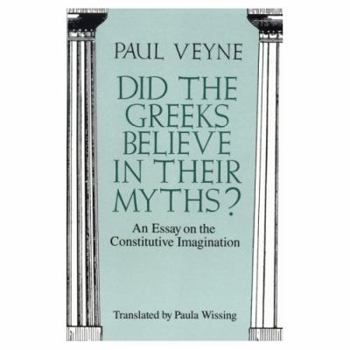Did the Greeks Believe in Their Myths?: An Essay on the Constitutive Imagination
Select Format
Select Condition 
Book Overview
" Veyne's] present book has some kinship with his sprightly theoretical work Comment on ecrit l'histoire; and he declares that its aim was to provoke reflection on the way our conception of truth is built up and changes over the centuries. . . . The style is brilliant and exhilarating."-Jasper Griffin, Times Literary Supplement
Format:Paperback
Language:English
ISBN:0226854345
ISBN13:9780226854342
Release Date:June 1988
Publisher:University of Chicago Press
Length:169 Pages
Weight:0.52 lbs.
Dimensions:0.7" x 5.7" x 8.7"
Customer Reviews
4 ratings
Further Implications Than the Title Suggests
Published by Thriftbooks.com User , 15 years ago
I bought this book because I knew the author from his excellent book on Foucault ("Foucault, sa pensée, sa personne"; so far not translated into English) -- just for my wife to get an idea about this author's approach and style of thinking. When I started the book I had no idea what was coming my way; maybe something like a post-script to Dodds' "The Greeks and the Irrational". Far from that! Before you know it you are drawn into is a profound dialogue about the very constituents of our thinking: all in the disguise of a scholarly essay about antiquity. This will rock your foundations, no matter how solid or soft they are. It opens up a window onto how "truth" and "thinking" (= the "finding of truth") are conditioned and defined by the circumstances of time and place. It gives me some insights why seemingly intelligent people go to church, engage in weird "spiritual" practices, and (say that they) believe in stuff that is proven not to work. The irrational as a valid mental constituent to be reckoned with... Constitutive imagination is not bound by logic or scientific proofs. It's pure imagination - and we seem to have an inborn right to it. It makes us tick - one way or the other...
Were the Greek gods just mythical?
Published by Thriftbooks.com User , 18 years ago
Two millenia ago and counting Xenophanes observed that people tended to worship dieties culturally similar to themselves. And so, people of India worshiped Indian born deities; people of Egypt worshiped Egyptian deities and Greeks worshiped Greek deities. According to Xenophanes, the process demonstrated the inherently mythical nature of faith. In Veyne's brilliant the point is made that perhaps another view is possible: that truth has a relativistic quality. And also: that perhaps Xenophanes was being unduly dismissive. In other words, we need not endow our myths we mutually exclusive truth. So your truth and my truth can be different but still...well...true. Viewed this way there's a certain political correctness to Veyne's approach. If in creating our cultural deity we recognize the divine in ourselves, maybe after all, that's not such a bad thing.
A kind of book that'll make you THINK!
Published by Thriftbooks.com User , 19 years ago
There are 2 kinds of books: those that provide you with knowledge, and those that provide you with a method of understanding. Most of books belong to the first category; but they’re useless if you don’t know how to understand them. Books of the second type are rare and priceless: once you’ve read one of them different perspectives, closed before, open before you. Few of us have seriously thought what hides behind the common concepts of our time: truth, causality, science, knowledge, etc. We use these words mechanically, without thinking, without understanding that these notions are historical, not eternal. Books like that of Paul Veyne make a "revision" of foundations of our thinking, providing us with another scheme of thinking, radically different from the common-sense one. And, as P.Veyne says, "two schemes are better than one". Behind the seemingly narrow and specialised title "Did Greeks believe in their myths?" really hides a philosophical essay on the nature of our world-view. What is truth, and is it possible that there’re many "truths", not just one? Did the concept of truth in modern sense exist in ancient times? When did modern history begin and what’re its methods? What is myth, and isn’t our science (Einstein, Freud, etc.) also based on its own myth? What is the sociology of truth, and its social distribution? What is faith, and its relation to power? How should we read ancient cosmogonies? Is myth a way of thinking, or a kind of knowledge, or something else? When did the notion of "historical time" appear, and are other concepts of time possible? All these questions are brilliantly addressed in this little book, and are masterfully answered. Buy this book and read it attentively: it’s worth your time!:)
How to break out of the fish bowl
Published by Thriftbooks.com User , 24 years ago
Paul Veyne in this work attempts to look at the different conceptions of truth that have existed in different times. Not always has the standard for truth been verifyability. In the end, in a remarkably poignant chapter, he explains how our own notions of truth may explain our inability to break out of the fishbowl of modern life, inhibiting our conceptual imaginations, our ability concieve new structures and visions for our life. The analysis is very Nietzschean and should be read by anyone who attempts to write history as it clarifies just what is at stake with the prefered methodology.





